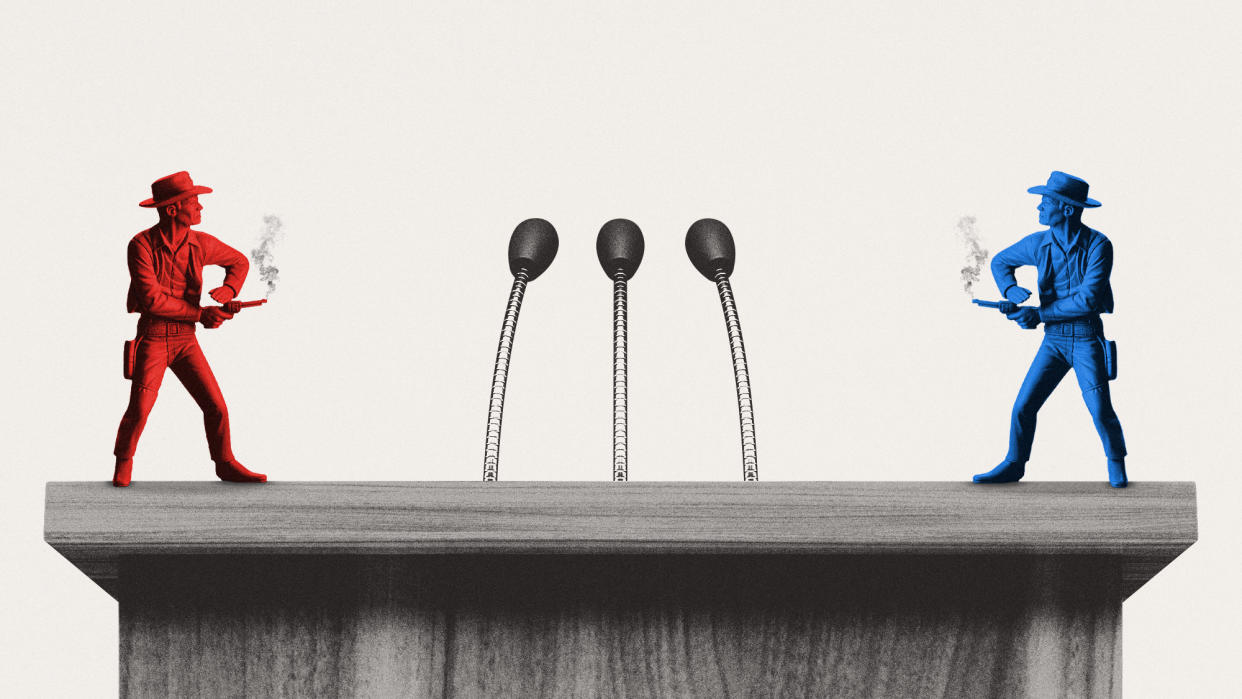First TV election debate: who will win?

Rishi Sunak and Keir Starmer will go head to head in a general election debate hosted by ITV this evening.
Televised leaders' debates are a "relatively recent phenomenon" in UK politics, with the first taking place in 2010, but have since acquired "major significance", said the Financial Times (FT). That is partly thanks to the breakthrough moment the debates proved for then Liberal Democrat leader Nick Clegg, winning him a "short-lived polling bounce" dubbed "Cleggmania".
Subsequent debates, however, have produced more heat than light and party leaders have "agonised" over the benefits and drawbacks of participating, said The Guardian. The front runner "tends to have the most to lose", but as Theresa May found in 2017, bowing out entirely can be just as damaging.
Sunak, whose party is trailing in the polls, has challenged Starmer to debate him every week of this election campaign. But the Labour leader has so far agreed to take part in only two debates, telling the paper: "I can do one debate or 100, I know what Sunak is going to say."
The hour-long programme, titled "Sunak v Starmer: The ITV Debate", will be broadcast from 9pm and moderated by presenter and journalist Julie Etchingham, who also hosted debates in 2015, 2017 and 2019.
What did the commentators say?
Both leaders have devoted hours to preparing for this evening's debate to "avoid the kind of slip-ups that quickly proliferate to a wider audience on social media", said the FT. Sunak has been working with deputy prime minister Oliver Dowden – playing the role of Starmer – to "try to find a way of pinning down what he has claimed are the Labour leader's 'vague' promises".
Starmer has been working with Labour official Tom Webb, who helps him to prepare for Prime Minister's Questions, to get him into the spirit of a "prosecutor interrogating Sunak for 14 years of failure", one aide told the paper. We don't see how the PM can answer those questions, they added, "because there is no good answer".
But if voters tune in tonight hoping to hear the party leaders respond "spontaneously and authentically to questions" they are "likely to be disappointed", said Jen Birks, associate professor in Media and Political Communication at the University of Nottingham, writing for The Conversation. Viewers don't expect to "learn anything new about the candidates or their policies" but are usually "intrigued by the spectacle of adversarial conflict".
The political parties campaigning in the general election know this; Sunak's enthusiasm for having a debate every week of the campaign has "probably less to do with any benefit he expects to gain from putting his case to the public than a desire to maximise the opportunities for Starmer to make some kind of gaffe".
Yet it is Sunak, with his party languishing some 20 points behind in the polls, who will have the bigger hill to climb during the debates and the campaign as a whole.
Sunak has just "two jobs" tonight, said Labour peer and former adviser Ayesha Hazarika, on Sky News's election podcast Electoral Dysfunction. "He's got to try and really land a blow on Starmer. And given that he hasn't really done that at PMQs, that is quite a high bar for him." His second job is to appeal to the old Tory voters who are "flirting" with the Reform Party, and convince them to "come back home" to the Conservatives.
Starmer, on the other hand, only has one job: "he's got to look like a prime minister".
What next?
The truth is that "people take more about personality and character away from these debates than they do about policy", said Times Radio political editor Kate McCann writing for the i news site. "Few will pore over manifestos – only a handful of very dedicated journalists will read them cover to cover."
Many voters will instead make a judgement "based on gut instinct, experience and the cut-through moments through the campaign". Making a "good personal impression" tonight "might be the best either man can hope to achieve".
But with Sunak lagging so far behind in the polls, Conservative insiders say he needs a "game-changing moment", said the BBC's chief political correspondent Henry Zeffman. If that moment fails to arrive, then some in the Tory party "will start to panic".


